SanDisk Extreme Pro SSD (240GB, 480GB & 960GB) Review: The Fastest Just Got Faster
by Kristian Vättö on June 16, 2014 4:00 PM EST- Posted in
- Storage
- SSDs
- SanDisk
- Extreme Pro
Random Read/Write Speed
The four corners of SSD performance are as follows: random read, random write, sequential read and sequential write speed. Random accesses are generally small in size, while sequential accesses tend to be larger and thus we have the four Iometer tests we use in all of our reviews.
Our first test writes 4KB in a completely random pattern over an 8GB space of the drive to simulate the sort of random access that you'd see on an OS drive (even this is more stressful than a normal desktop user would see). We perform three concurrent IOs and run the test for 3 minutes. The results reported are in average MB/s over the entire time.
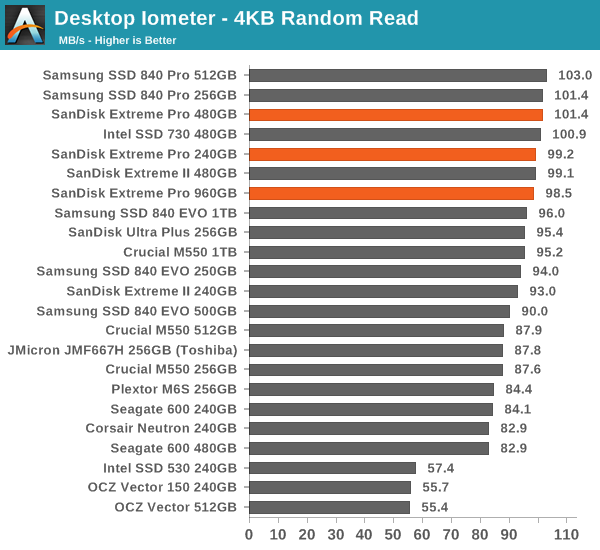
The random read performance is great, which was expected when coming from the Extreme II.
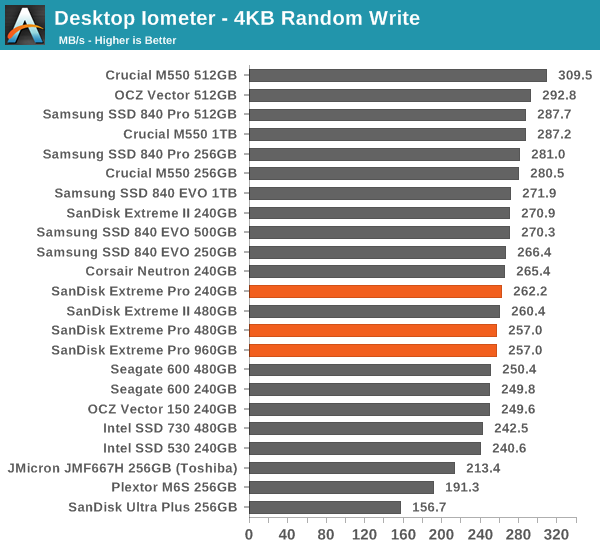
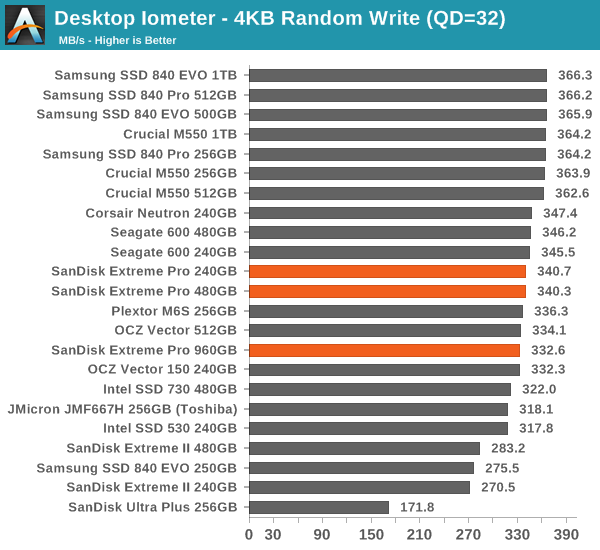
Random write performance, on the other hand, is only mediocre, although it's consistency that matters and not necessarily the peak performance. It seems that drives with high consistency do not have as good peak performance because the Extreme Pro, Vector 150 and SSD 730 are in the middle, whereas the 840 EVO and M550 lead the pack despite their relatively poor IO consistency. I would take consistency over ~10% better peak performance, though.
Sequential Read/Write Speed
To measure sequential performance we run a 1 minute long 128KB sequential test over the entire span of the drive at a queue depth of 1. The results reported are in average MB/s over the entire test length.
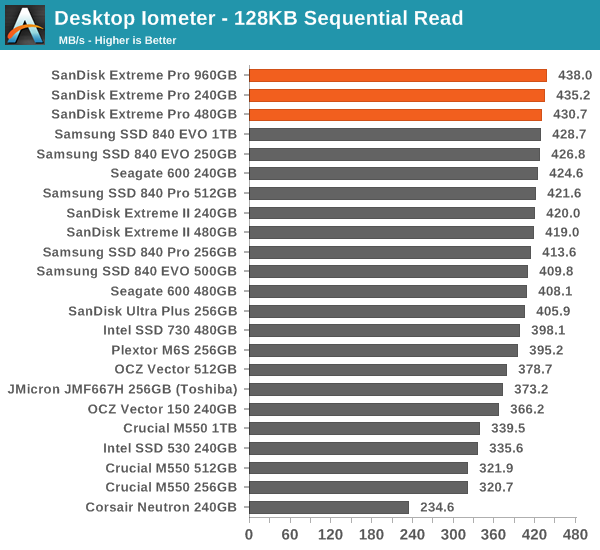
Sequential performance is definitely good. I think the high read speed is one of the reasons why the Extreme Pro did so well in the 2013 Storage Bench because both the SSD 730 and Vector 150 are noticeably slower.
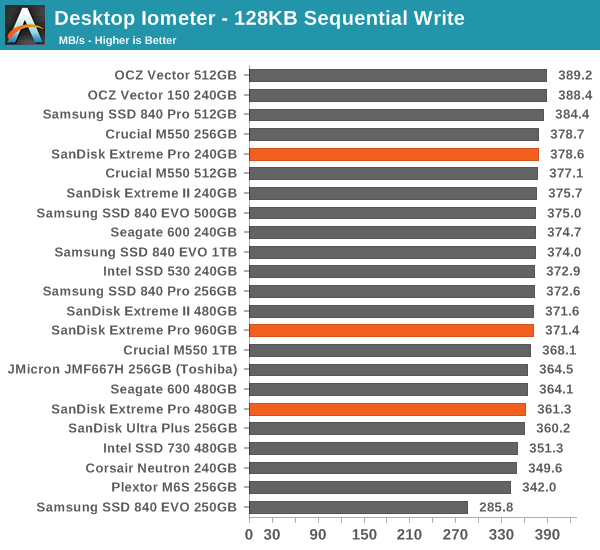
AS-SSD Incompressible Sequential Read/Write Performance
The AS-SSD sequential benchmark uses incompressible data for all of its transfers. The result is a pretty big reduction in sequential write speed on SandForce based controllers.
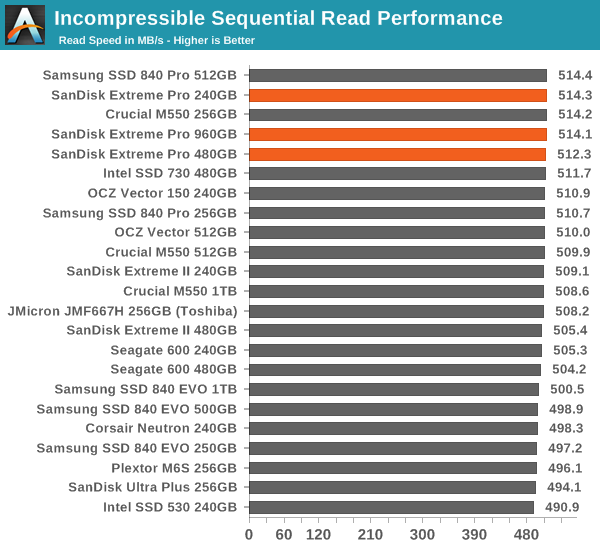
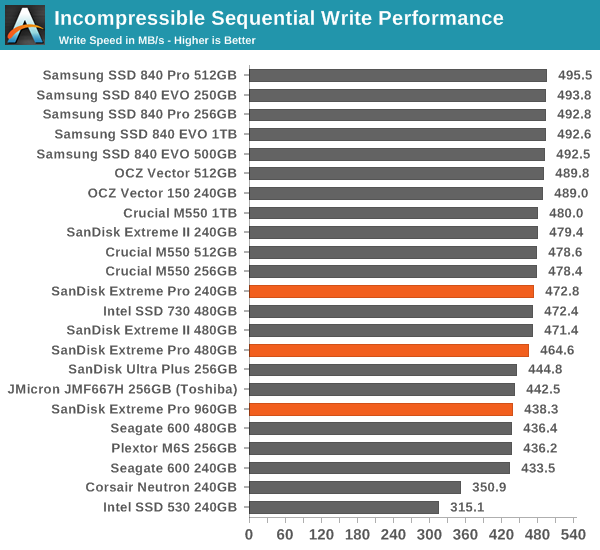










85 Comments
View All Comments
Solid State Brain - Tuesday, June 17, 2014 - link
@Kristian VättöIf you still can, could you please post somewhere some screenshots (preferably) or write down the description/name for all SMART attributes for this drive from the SanDisk SSD Dashboard under the SMART tab?
SanDisk doesn't readily provide this information to the public, and if you could fulfill this request, it would get easier to make sense of those attributes with other popular third party drive SMART information tools such as CrystalDiskInfo.
This is what I got on my Extreme II SSD from that SanDisk SSD Dashboard. As far as I know the Extreme PRO has more/different SMART parameters, which is interesting since the controller should be the same:
5 / 05 - Retired Block Count
9 / 09 - Power On Hours
12 / 0C - Device Power Cycle Count
166 / A6 - Min W/E Cycle
167 / A7 - Min Bad Block/Die
168 / A8 - Maximum Erase Cycle
169 / A9 - Total Bad Block
171 / AB - Program Fail Count
172 / AC - Erase Fail Count
173 / AD - Average Erase Cycle
174 / AE - Unexpected Power Loss Count
187 / BB - Reported Uncorrectable Errors
194 / C2 - Current Temperature
212 / D4 - SATA PHY Error
230 / E6 - Percentage Total P/E Count XX.YY
232 / E8 - Spare Blocks Remaining
233 / E9 - Total GB Written to NAND
241 / F1 - Total GB Written
242 / F2 - Total GB Read
243 / F3 - [?]
Kristian Vättö - Tuesday, June 17, 2014 - link
My drives are currently at my friend's place as he does the photography for me (I don't have a DSLR), so I can't do this right now. However, I'll swing by his place next week at the latest, so feel free to remind me via email (kristian@anandtech.com) in a week or so if I forget :)Solid State Brain - Tuesday, June 17, 2014 - link
Ok, I will. FYI, I plan to submit that information to the CrystalDiskInfo author. After I sent him SMART attribute information for the Extreme II he promised to implement it in the next program version (so that they will not appear as "vendor specific" anymore).Seville Orange - Tuesday, June 17, 2014 - link
What happens to performance consistency if the drive has a few partitions?Say you have 50GB for Windows, 30GB for Linux, 10GB for Swap - if you use the remaining space as a partition will you then get max performance? or will the performance be reduced regardless because partitioning has the same effect as leaving spare area?
josquin - Thursday, July 10, 2014 - link
I also would like to get the answer to this question.croc123 - Tuesday, June 17, 2014 - link
Not to pick nits, but "SanDisk Extreme Pro SSD (240GB, 480GB & 960GB) Review: The Fastest Just Got Faster" seems to me to be a bit of hyperbole unsupported by the facts... A paid review, perhaps?Kristian Vättö - Tuesday, June 17, 2014 - link
The Extreme II was already the fastest SATA SSD, so in that sense "the fastest just got faster" because the Extreme Pro is essentially a tweaked Extreme II. I know we don't often use such headlines but I think in this case it's justified. Of course, feedback is always welcome -- do you prefer the general headlines instead?MrX8503 - Tuesday, June 17, 2014 - link
The tests show that it is the fastest. What kind of facts are you looking for?junky77 - Tuesday, June 17, 2014 - link
That's what I wanna get 4 years from now, with M.2 interfacejuhatus - Thursday, June 19, 2014 - link
That´s sarcasm right? M.2 PCI-E ssd are already 3x faster and with nvme, alot more.Comment on:
"All in all, the Extreme Pro is the only no compromise high-end SSD in the market." I would say high-end SATA SSD, this extreme pro is going to look like slow drive in 2015 with all the M.2 craze. So price is all that much more important factor, your going to pay hefty premium when there are multitudes faster products coming(and existing) and SATA/ACHI is capping your performance. Sata is dead, long live the new Sata :)
Im hoping my Z97 built this summer boots from M.2(or heck even pcie), any chance of getting article about that?